March 2018 E-Update
NKCF Family Symposium
More than eighty people attended the Keratoconus Family Symposium on the UC-Irvine campus in California on February 10. The day-long event offered an opportunity to hear experts lecture on topics ranging from accommodation in the workplace to the latest technology for scleral lenses, as well as the chance to meet other members of the KC community.
Sessions like Coping with KC, led by psychiatrist Mindy Hutchinson, MD and Practical Pointers and Products by Rebecca Petris of the Dry Eye Shop sparked conversation and questions by the attendees.
Dr. Gloria Chiu, OD of USC/Roski Eye Institute and Dr. Vivian Shibayama, OD of UCLA/Jules Stein Eye Institute offered comprehensive overviews of contact lens options. Faculty from the Gavin Herbert Eye Institute offered presentations on cross-linking and corneal transplants.
At the conclusion of the event, Rachel Dungan, a KC patient advocate shared her powerful story about coming to terms with KC and offered ways to help patients empower themselves and their community.
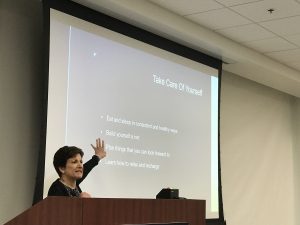
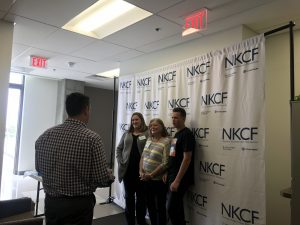
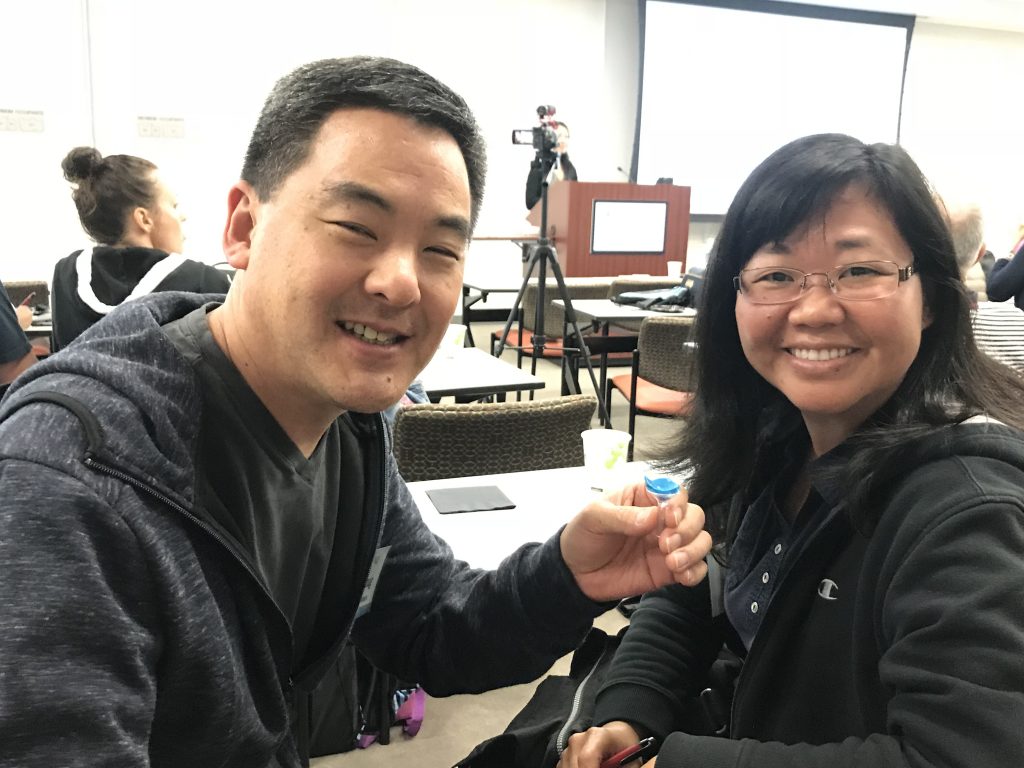 Guests benefited from comparing notes with other KC patients. In order to foster connections and communication, the KC Story Alcove was created and a video team interviewed family members and patients about their KC journey.
Guests benefited from comparing notes with other KC patients. In order to foster connections and communication, the KC Story Alcove was created and a video team interviewed family members and patients about their KC journey.
We can’t wait to share the day visually with you! Videos from the Symposium sessions and the KC Story Alcove will be available on our website soon.
Some of the Symposium expenses were underwritten by a grant from Avedro. We are grateful for their support of the KC community.
Practical Pointers & Products for CL wearers
Contact lens tips & products from Rebecca Petris of the Dry Eye Shop.
One of the most anticipated talks at the KC Family Symposium was the presentation by Rebecca Petris, owner of the Dry Eye Company. By way of introduction, she shared her story: after lasik surgery, she developed extreme dry eye and investigated products that would ease her symptoms. She soon acquired such a wealth of knowledge she changed careers and created an on-line boutique that serves contact lens wearers and individuals with dry eye. Rebecca has gained the trust of both clinicians and patients with her honest and helpful tips. She runs on-line message boards, offers advice and information through her blogs, and sells product on-line and through her Dry Eye Shop in western Washington.
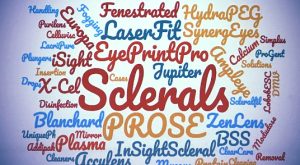
How Common is KC?
The question is often asked and the standard answer may not be accurate at all…
Last year, NKCF reported a paper that used took advantage of new diagnostic technology as well as megadata. Using the nationwide health database, the authors looked at the medical records of 4.4 million individuals in the Netherlands and estimated the prevalence of keratoconus in this European country was closer to 1 in 375.(2)
The general belief among experts is that the rate of keratoconus is especially high among certain ethnic groups, including those of Middle Eastern descent. The British Journal of Ophthalmology is soon to publish a remarkable paper summarizing the results of a study conducted by King Saud University. (3)
Saudi children and young adults, between the age of 6 and 21, who were seen in emergency rooms at four Riyadh hospitals for non-ophthalmic reasons, were invited to be screened for evidence of keratoconus.

The Pros & Cons of Going Piggyback
Is the piggyback system right for you?
Vision correction options for KC patients continue to grow. Although scleral lenses are currently getting most of the attention, they aren’t for everyone. Some patients might do better with other choices such as piggybacking, to achieve good vision and comfort. Piggybacks are often used when GP lenses do not center well on the cornea or cause irritation or ‘lens awareness’.
The piggyback system consists of a rigid gas permeable (RGP or GP) lens sitting on top of a soft contact lens. This combination offers the clear vision of a GP lens without the discomfort that many patients feel wearing hard lenses. The soft contacts act as a shield and a cushion to provide additional comfort.
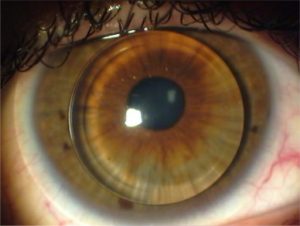
Scleral Lenses Reduce the Need for Corneal Transplants
Can the use of scleral lenses help avoid a future corneal transplant?
At an international meeting of contact lens experts, Dr. Carina Koppen, MD, PhD of Belgium discussed her research and a recent paper published in the American Journal of Ophthalmology (1).
As a keratoconus expert and chief of ophthalmology at Antwerp University, she is trained in both the surgical and medical management of KC. She was interested to learn if a decline in rates of corneal transplantation could be traced to the increased use of scleral lenses.
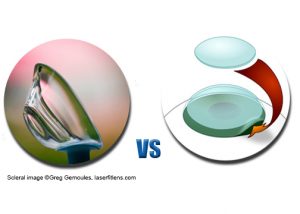
National Doctors Day 2018
Help us honor your eye care doctor!
Say thanks to your eye doctors between now and March 30 and tell us why they make a difference in your life. We’ll send your doctor a special message on your behalf, and NKCF will highlight some of the stories on our website.
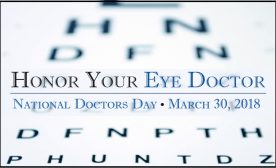
Corneal Ring Segments On-Line Survey
Intrastromal Corneal Ring Segments (Intacs®) were introduced in the early 2000s as a surgical method to flatten the cornea and improve vision. There are doctors and patients who swear by the technology, but many eye doctors who treat keratoconus patients neither recommend implanting the devices, nor refer their patients to surgeons for the procedure.
Intacs are not a cure. They will they stop progression of keratoconus. In the best outcomes, they offer increased tolerance of contact lenses, and improvement in visual acuity. As with all procedures, understanding the likely outcome keeps expectations in line with results.
NKCF asked our newsletter subscribers to share their Intacs experience. We received 95 responses.
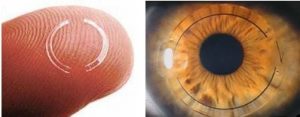
NEW NKCF Keratoconus Patient Guide!
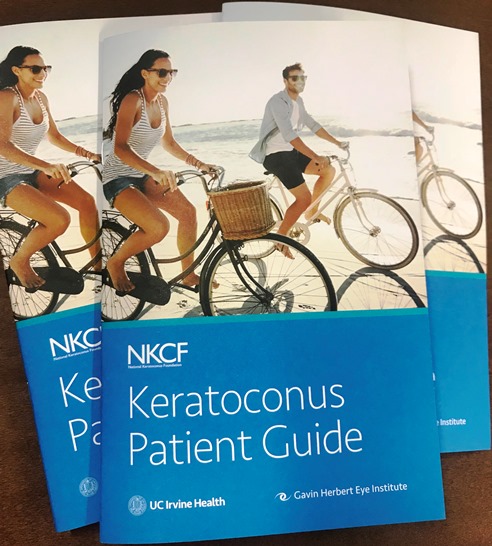 This 22-page, full-color brochure replaces the “What is Keratoconus?” 6th edition booklet and includes newly updated information about the causes and treatments of keratoconus, including crosslinking and scleral lenses. This new guide is especially useful for newly-diagnosed patients as well as for family members and friends of KC patients.
This 22-page, full-color brochure replaces the “What is Keratoconus?” 6th edition booklet and includes newly updated information about the causes and treatments of keratoconus, including crosslinking and scleral lenses. This new guide is especially useful for newly-diagnosed patients as well as for family members and friends of KC patients.
Available for both patients and eye care providers.
If you prefer to send a check, payable to UCI Foundation
to support NKCF, please mail it to:

 ⇒
⇒ 